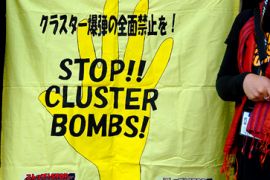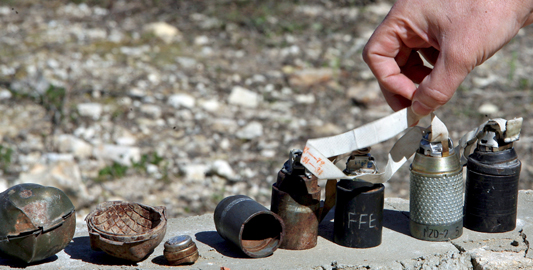Draft cluster bomb ban agreed
More than 100 nations agree in Dublin to proposals banning cluster bombs.

 |
| More than 100 countries are behind proposals to ban cluster bombs [File: EPA] |
A conference of 109 nations has agreed on a draft treaty to ban current designs of cluster bombs and to destroy stockpiles within eight years.
The announcement on Wednesday came after 10 days of negotiations in Dublin, the Irish capital.
Christian Ruge, a member of the Norwegian delegation, said: “It’s a strong and robust prohibition on all known cluster munitions.”
The agreement was made possible due to a settlement on two key issues.
A central sticking point was how the armed forces of those nations signing any treaty would work alongside nations who have not signed up.
The treaty will allow signatories and non-signatories to work together in military deployment.
Additionally, it allows the use of future cluster bombs which pick targets more precisely and contain self-destruct technology.
The draft will be submitted to a plenary session on Friday, the last day of the Dubllin negotiations. However, its approval is now seen as a formality.
No US involvement
The United States did not send an envoy to the conference.
| Factfile |
|
Cluster bombs |
They said that the proposed convention would hinder humanitarian activities because its military has such weapons on its inventories.
Stephen Mull, an assistant secretary of state, said: “Any country that signs the convention in effect would make it impossible for the United States or any of our other allies who rely on these weapons to participate in these humanitarian exercises.”
Israel, Pakistan, China and Russia, along with the US, are among the main producers and stockpilers of the weapon. They all oppose any ban.
Britain did not initially express support for the ban, but changed tack and has agreed to the draft.
Marc Garlasco, a military analyst with Human Rights Watch who was at the conference, told Al Jazeera: “We have a monumental achievement today.
“We will now see a future in which not only will these weapons not be used, but [the treaty] also provides for victim assistance as well as clearance of weapons that have been used in the past.”
Garlasco said that although the US and other nations have not committed to signing the agreement he expects pressure and stigma over using the weapon due to the treaty to prevent those nations from using cluster munitions.
December ratification
The treaty will be formally signed in December in Norway.
Talks began in Norway in February 2007 to end the use of the bomb.
In what is known as the Oslo Declaration, 46 governments agreed to create a legally binding instrument prohibiting the use of cluster munitions and providing adequate resources to assist survivors and clear contaminated areas during 2008.
When fired, cluster munitions release small “bomblets” in mid-air, which spread over a large area.
Many of the bombs do not detonate and remain dangerous, injuring and killing civilians outside of war time.
